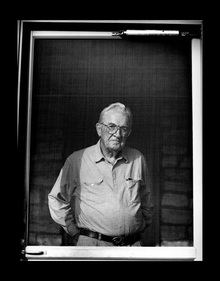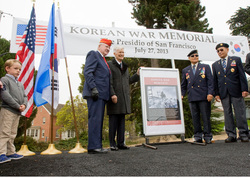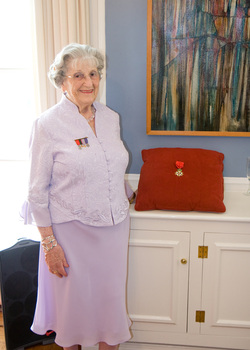The fellow staring at my lens is John Graves, a WWII Marine, retired rancher and Texas' most beloved writer. That last is not my opinion, many in the Lone Star State will say so, including former first lady (and librarian) Laura Bush. He is best known for Goodbye to a River, which has never been out of print since it was first published in 1957.
Are we related? No and yes. No clear connection we can point to, but Graves is not an uncommon name, and he told me we probably are, way back. Although my dad's from Tennessee and John's from Texas, people keep moving west, he said, looking for a new opportunity or abandoning the last one that didn't work out. My dad left Tennessee as soon as he could and followed his older brother west to California, for instance, before the Army sent him two steps back to New Jersey before sending him overseas in 1943.
John Graves was a young Marine lieutenant in the Pacific and was wounded on Saipan. He recovered well but lost sight in one eye. I asked him if it affected his marksmanship (a Graves point of pride) and he admitted it did. Like many others, the GI Bill allowed him to continue his education, which he did at Columbia University, earning a master's degree. It was the 1950s. He traveled to Europe when it was cheap and led the life of a young American writer abroad at the same storied time as Hemingway and others. He wrote and for a while sailed the Meditteranean in his own boat--something I found unusual for a man growing up far from the coast. Europe was cheap then, even so, writing is rarely a profitable pursuit. The disability payment for his wounds must have helped pay his way until his career was established.
We met only one time, but we wrote back and forth; I always began my letters, "Dear Cousin John." He was amused but not truly comfortable with that. I bought every book he published and sent them to Texas for him to sign and mail back to me. My collection is small but very valuable to me.
Graves passed away Wednesday at age 92. I suppose the family is gathering at the ranch this weekend. I'll think about a good time to give them a call.
Are we related? No and yes. No clear connection we can point to, but Graves is not an uncommon name, and he told me we probably are, way back. Although my dad's from Tennessee and John's from Texas, people keep moving west, he said, looking for a new opportunity or abandoning the last one that didn't work out. My dad left Tennessee as soon as he could and followed his older brother west to California, for instance, before the Army sent him two steps back to New Jersey before sending him overseas in 1943.
John Graves was a young Marine lieutenant in the Pacific and was wounded on Saipan. He recovered well but lost sight in one eye. I asked him if it affected his marksmanship (a Graves point of pride) and he admitted it did. Like many others, the GI Bill allowed him to continue his education, which he did at Columbia University, earning a master's degree. It was the 1950s. He traveled to Europe when it was cheap and led the life of a young American writer abroad at the same storied time as Hemingway and others. He wrote and for a while sailed the Meditteranean in his own boat--something I found unusual for a man growing up far from the coast. Europe was cheap then, even so, writing is rarely a profitable pursuit. The disability payment for his wounds must have helped pay his way until his career was established.
We met only one time, but we wrote back and forth; I always began my letters, "Dear Cousin John." He was amused but not truly comfortable with that. I bought every book he published and sent them to Texas for him to sign and mail back to me. My collection is small but very valuable to me.
Graves passed away Wednesday at age 92. I suppose the family is gathering at the ranch this weekend. I'll think about a good time to give them a call.





 RSS Feed
RSS Feed
